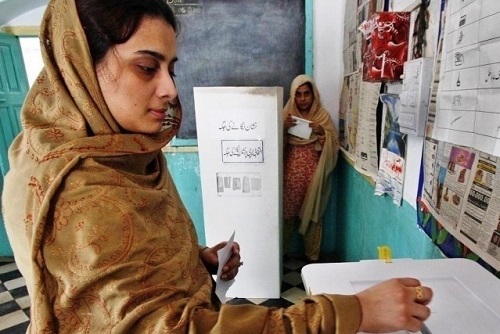By
Muhammad Shoaib Khan
Transgender, disabled and women’s rights activists to be included in electoral process
A unique coalition for transgender, disabled and women rights’ activists has been launched to take part in the electoral process in Pakistan’s upcoming general election and exercise their right to vote independently, in secret and with dignity.
The coalition of 30 transgender, disabled and women rights activists titled “Coalition for Inclusive Pakistan (CIP)” was launched in Islamabad, with the support of Trust for Democratic Education and Accountability (TDEA), and has the representation of marginalized people from all over the country.
The purpose of forming such an alliance was in line with the provisions of the Elections Act 2017 that contain certain positive aspects to facilitate participation of transgender, disabled and women in the electoral process.
The Election Commission of Pakistan (ECP) ensured that the new election law is implemented in both letter and spirit. Analysts appreciated the work being done by the Gender and Disability Electoral Working Group of the ECP and the CIP would closely work with it for the achievement of their electoral rights.
The discussion is ongoing that the barriers that hinder the participation of the transgender people, the disabled and women in the electoral process and restrict their ability to exercise their right to vote are actually the barriers that hinder their participation in mainstream life. These barriers put curbs on their ability to exercise their other basic rights and in the enjoyment of fundamental freedoms. Some of the people have an opinion that the ECP should make arrangements so that transgender voters are able to cast their vote independently and with dignity on equal basis with others and should train polling staff in this regard.
It was conversed that at present Section 12c requires the ECP to conduct public awareness programs and media campaigns regarding the importance of maximum voter enrollment and participation in the election of women. It was necessitated that transgender people and people with disabilities along with women should also be included in such programs and campaigns through progressive interpretation of Section 12c.
This development was welcomed by people that Section 93 facilitates voters with disabilities to cast their votes through postal ballots. However, it should be noted that the option of postal ballots supplements and does not supplant the right to vote of the disabled voters in public. Therefore, the ECP should develop criteria for the selection of polling stations and such a criterion should give preference to polling stations that have a greater level of accessibility for wheelchair users. One of the suggestions that came up during this discussion was that the ECP should develop a mechanism to ensure inaccessible polling stations are not included in the polling scheme.
The ECP will ensure that its public service messages on voter education in the lead up to general elections are delivered in sign language as well so that these messages are accessible for speech and hearing-impaired voters. Similarly, ECP will create awareness and train polling staff about the right of the blind and visually impaired voters to cast their vote independently, in secret and with dignity with the help of a companion or the polling staff.
So the future of Pakistan regarding democracy is bright and will lead this nation on the road of prosperity.
Muhammad Shoaib Khan
Muhammad Shoaib Khan is a journalist from Pakistan and has worked with NEO TV, Independent News, PBCand The Nation.



No Comments Yet!
You can be first to comment this post!